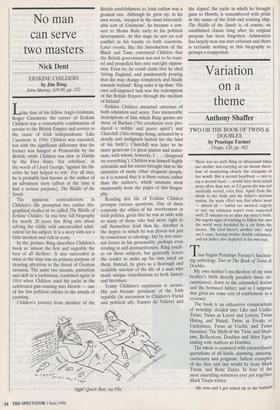No man can serve two masters
Nick Dent
ERSKINE CHILDERS by Jim Ring John Mutray, £19.99, pp. 332 Like that of his fellow Anglo-Irishman, Roger Casement, the career of Erskine Childers was a remarkable combination of service to the British Empire and service to the cause of Irish independence. Like Casement in 1916, Childers was executed, but with the significant difference that the former was hanged at Pentonville by the British, while Childers was shot in Dublin by the Free State, 'for rebellion', in the words of Lloyd George, 'against the lib- erties he had helped to win'. For all that, he is probably best known as the author of an adventure story (albeit at the time it had a serious purpose), The Riddle of the Sands.
The apparent contradictions in Childers's life prompted two earlier bio- graphical studies to be called The Riddle of Erskine Childers. In this first full biography for nearly 20 years Jim Ring sets about solving the riddle with unconcealed admi- ration for his subject. It is a story with not a little incident and rich in irony.
In the preface Ring describes Childers's book as 'almost the first and arguable the best of all thrillers'. It also succeeded in what at the time was its primary purpose of drawing attention to the threat of German invasion. The same two strands, patriotism and skill as a yachtsman, combined again in 1914 when Childers used his yacht in the celebrated gun-running into Howth — one of the few political entries in the annals of yachting.
Childers's journey from member of the Aggh! Quick Bert, my Pils.' British establishment to Irish outlaw was a gradual one. Although he grew up, in his own words, 'steeped in the most irreconcil- able sort of Unionism', he became a con- vert to Home Rule early in his political development. At this stage he saw no real conflict in his loyalty to both countries. Later events, like the introduction of the Black and Tans, convinced Childers that the British government was not to be trust- ed and propelled him into outright opposi- tion. Even so, he could claim that he died 'loving England, and passionately praying that she may change completely and finally towards Ireland'. Ring sums it up thus: 'His own self-imposed task was the redemption of the British Empire through the medium of Ireland'.
Erskine Childers attracted extremes of both adulation and scorn. Two memorable descriptions of him which Ring quotes are those of Buchan ('No revolution ever pro- duced a nobler and purer spirit') and Churchill ('this strange being, actuated by a deadly and malignant hatred for the land of his birth'). Churchill was later to be more generous Ca great patriot and states- man, with whom, however, I . . . disagreed on everything'). Childers was himself highly articulate and his career brought him to the attention of many other eloquent people, so it is natural that it is these voices, rather than the author's, which resonate most memorably from the pages of this biogra- phy. Reading this life of Erskine Childers prompts various questions. One of them concerns the ethics of his involvement in Irish politics, given that he was at odds with so many of those who had more right to call themselves Irish than he. Another is the degree to which he was driven not just by conscience or ideology, but by less ratio- nal forces in his personality, perhaps even tending to self-destructiveness. Ring touch- es on these subjects, but generally leaves the reader to make up his own mind on them. Instead, he gives us a thorough and readable account of the life of a man who made unique contributions to both history and literature.
Today Childers's reputation is secure. His son became president of the Irish republic (in succession to Childers's friend and political ally, Eamon de Valera) and the Asgard, the yacht in which he brought guns to Howth, is remembered with pride in the name of the Irish sail training ship. The Riddle of the Sands is, of course, an established classic long after its original purpose has been forgotten. Admiration has largely won out over criticism and there is certainly nothing in this biography to prompt a reappraisal.


























































 Previous page
Previous page